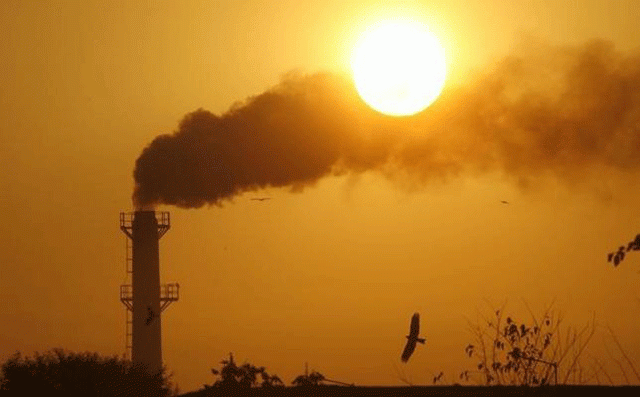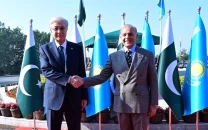IBA holds moot on climate change threats
Experts stress change at policy level for coordinated climate action

A youth-led dialogue is necessary for actions to mitigate the climate change impact, said the Institute of Business Administration (IBA) Executive Director Dr S Akbar Zaidi.
"A youth-led climate initiative will help prioritise the actions taken by the young people, community, business and political leaders and members of society," Zaidi said addressing a two day conference highlighting the subject of "Climate Change: Threats, Risks and Vulnerabilities" held at IBA on Saturday.
The conference was designed and organised by Center for Business and Economic Research (CBER) in association with Hanns Seidel Foundation (HSF) Pakistan. Zaidi said the student-led initiative by the Social Sciences and Liberal Arts (SSLA) Department is informative for the participants of the conference.
The conference included panel discussions, study circles, documentary screenings and exhibits. During the conference, HSF Pakistan Resident Representative Dr Steffen Kudella, stressed on the impact of climate change in Pakistan and Germany.
Apart from stating its negative influence on the ecosystem, Dr Kudella highlighted the effect of the climate change on water resources and food security in Pakistan.
The varying temperature, in fact, is not only challenging the ecosystems, but is having a huge impact on economies and the lives of general citizens, he commented.
Moreover, Dr Kudella built on to his argument by stating the consequences of the changing climate not only being limited to a certain socio-economic aspect, but also dominating our standards of living in addition to various non-traditional security challenges.
German Consul General Karachi Brigit Kuhlmann expressed her elation for the initiative and stressed that such events are highly needed to promote the importance to preserve the environment.
Read More: Known knowns of climate change
The two day event thoroughly addressed the impact of climate change and the growing need for a sustainable environment for the future generations.
IBA Dean of School of Economics and Social Sciences Dr Asma Hyder said that climate change is a hurdle in the way of sustainable development.
In addition, CBER Director Dr Laila Farooq stated that climate change is not distinguished from social problems such as race and gender.
The first panel, 'Ecology and the State', featured panelists SSLA City and Regional Planning Department Professor Dr Nausheen Anwar and Tufts University Lecturer Dr Erum Sattar, was moderated by an IBA student Ali Samoo.
The session shed light on the colonial administrative legacy and the inadequacy of the urban infrastructure in managing the climate crisis.
The panel on 'Critical Animal Studies, Animal Rights and Feminism' featuring Maneesha Deckha, Law Professor at the University of Victoria, questioned the category of animality in the bigger conversation of climate change and the populace's general insensitivity towards stray animals in discourse and policymaking.
Filmmaker Jawad Sharif addressed the Q&A session after the screening of his documentary film 'Natari' which dealt with the very important subject of climate migration and the struggle and resistance of fishermen on the island of Kharo Chan and the sinking Indus Delta.
Day-two of the conference touched upon 'The Feminist Movement and Climate Justice' where panelists identified the feminist interventions in the approach towards climate change.
The panelists included, Activist and Writer, Atiya Abbas; Culture Writer and Community Organizer, Aiman Rizwi; and activists and writers Fizza Qureshi and Basil Andrews; it was moderated by Safina Azeem, an IBA student.
The session on 'Subaltern Animism' featured Dr Yamini Narayanan, Senior Lecturer at Deakin University.



















COMMENTS
Comments are moderated and generally will be posted if they are on-topic and not abusive.
For more information, please see our Comments FAQ